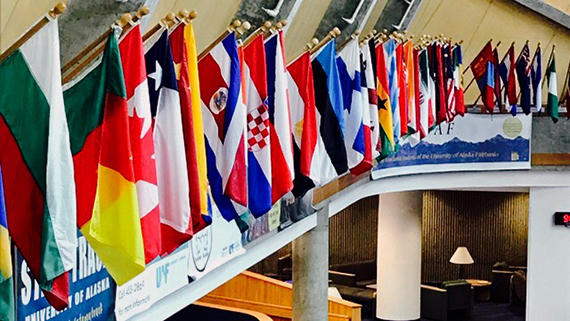Finnish Arctic expertise will be needed in the future at ever higher latitudes

Climate change is clearly taking place faster in the Arctic region than anywhere else. With climate change, travel, shipping and the utilisation of natural resources will also increase in the Arctic region, which will increase the demand for both observational data on the Arctic environment and services.
Finland is one of the world's most northern societies with permanent settlements, so challenging natural conditions are familiar to Finns. In order to enable the society to run its operations efficiently despite the snow and freezing temperatures, there is a need for weather observations, research and services to allow different actors to prepare for weather fluctuations. The Finnish Meteorological Institute focuses on improving the smooth and safe functioning of society using new information and communication technologies. This expertise will be needed in the future at ever higher latitudes.
The chairmanship of the Arctic Council will be transferred from the US to Finland in May. The main themes for Finland's chairmanship are environmental protection, meteorological cooperation, communication solutions and education.
Safe and sustainable operations in the Arctic region require close meteorological cooperation. The Finnish Meteorological Institute already monitors and produces different kinds of observation data from both Finland and elsewhere in the Arctic region. ‘In order to be prepared for the changing conditions in the Arctic, we need better understanding and long-term monitoring of the weather, climate, ice, and sea conditions. A prerequisite for this is that the weather, ice, sea and climate observations are developed in international cooperation. This enables the research of the changing conditions in the Arctic and service development for the needs of Arctic activities. The chairmanship of the Arctic Council offers us an excellent opportunity to build networks and foundations based on permanent international cooperation,' explains Juhani Damski, Director General of the FMI.
Sodankylä Arctic Space Centre produces environmental information on the Arctic Region
The Finnish Meteorological Institute's Arctic Space Centre, located in Sodankylä, produces important data for the Arctic region by utilising the newest satellite and space technology. The centre also produces services that are of importance to the Arctic region's security. In the Arctic Space Centre, the full range of operations is carried out, from receiving and processing satellite data through to data distribution and utilisation. Data transmitted by satellites can be utilised, for example, in meteorological weather services, ice services and climate research.
In Sodankylä, unique satellite-based information is produced for the whole northern hemisphere covering phenomena such as snow cover, soil freezing and the Aurora Borealis. The long-term time series obtained from satellite observations can also be used in areas such as climate change research.
Sodankylä's infrastructure has been developed so that large satellite data masses are accessible via an interface that can be read mechanically or as a cloud service. The cloud service and virtual calculation platforms constructed in Sodankylä facilitate the development and production of new added value services and products. In principle, a lot of the data is entirely free.
Further information:
Director General Juhani Damski, tel. +358 (0)29 539 2200, Juhani.damski@fmi.fi
Johanna Ekman, tel. +358 (0)29 539 2079, johanna.ekman@fmi.fi
